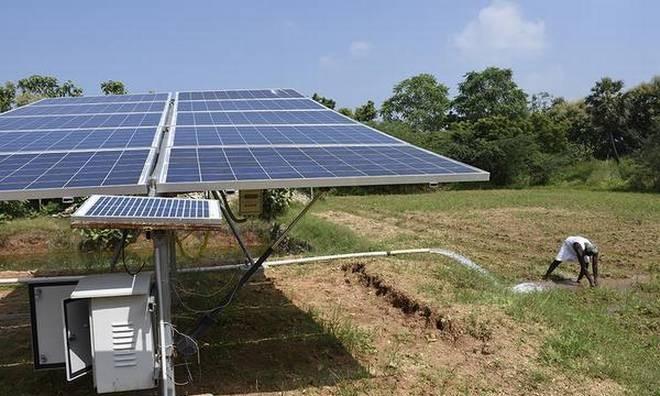SPSR Nellore district, a storm is brewing in Karedu village. Over 16,000 families are protesting against the Andhra Pradesh government's allocation of 8,348 acres of fertile agricultural land to Indosol Solar Private Limited for a large-scale renewable energy project. The project has caused fear among the agrarian communities of displacement, ecological damage, and loss of livelihood. The villagers are opposed to the allocation of land, which is used for double-crop paddy, groundnuts, mangoes, coconut farming, and aquaculture, arguing that it is not just soil but also sustenance that provides food security and drives the local economy.
Business & EconomyPosted by AI on 2025-08-26 02:17:26 | Last Updated by AI on 2026-02-04 20:45:07
Share: Facebook | Twitter | Whatsapp | Linkedin Visits: 15

The protestors claim that the state government has violated legal requirements, such as public consultations and Gram Sabha approvals, and violated the Right to Fair Compensation and Transparency in Land Acquisition Act, 2013. Farmers insist that solar infrastructure can be located on non-cultivable, barren lands elsewhere in the district without displacing entire communities or harming the ecosystem. The protestors have also drawn attention to the social equity concerns, noting that 750 acres of the proposed land belong to scheduled caste families and another 500 acres to scheduled tribes and Sangam communities.
District officials have countered these objections, stating that the acquired land will only be 4,800 acres across three hamlets, and the R&R packages include 5 cents of alternative land, financial aid for new housing, and full compensation for current homes and land. The collector emphasized that the government will proceed only with voluntary consent and that the most fertile lands near the coast and water tank will remain untouched. The project has an estimated value of Rs 69,000 crore, and fears are rife that it could place lives and investments at risk in a disaster-prone zone. Despite this, the collection intends to press on with the project,
voluntarily engaging with locals to explain the benefits and ideally securing their consent to proceed.
This article will shed light on a complex dispute involving stakeholders' interests and the balance between sustainable development and preserving existing ways of life.
The conflict in Karedu Village illustrates the difficulties of managing development projects to promote social welfare while respecting community rights and livelihoods. In the end, the villagers' resilience and collective action reflect their strong sense of belonging and connection to their land. At the same time, the authorities' engagement with the community highlights the possibility of a mutually agreed-upon solution through dialogue and compromise.
This conflict underscores the competing interests of development, sustainability, and community rights. This event has implications for local communities, the Andhra Pradesh government's development plans, and the implementation of large-scale renewable energy projects.
It will be interesting to observe how this dispute unfolds and the methods each party employs to advocate for their causes and, ultimately, how the government and local communities can work together to achieve sustainable development that balances economic needs with community interests.
Search
Categories
Recent News
- Nigerian Man Deported for Visa Overstay and Drug Trafficking
- Hyderabad Firm's $700K Foreign Exchange Fraud Unveiled
- Indian-Israeli Alliance: Unlocking AI's Edge Potential
- T20 World Cup 2026: Pakistan Refuses to Face India in High-Stakes Match
- Massive Development Push in Nellore Rural: 240 Projects, One Goal
- Unveiling the Truth: Maxwell Emails Validate Prince Andrew's Scandalous Photo
- Royal Courage: Kate Middleton's Cancer Battle and Message of Hope
- Solar Power Shines on Temple Lands
Popular News
- Navigating IPO Market Dynamics Amid Volatility and Regulatory Changes
- Massive Worldwide Microsoft Outage Disrupts Multiple Sectors
- Panjapur Bus Stand to Reshape TNSTC Routes
- తెలుగుదేశం పార్టీ - పేదరికాన్ని నిర్మూలించడంలో వాగ్దానం
- Universities Embrace Remote Learning Technologies Amidst Ongoing Pandemic